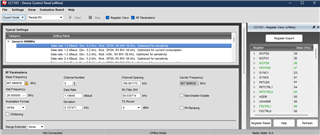Tool/software:
Hello,
I’m using SmartRF Studio with a CC1101-based setup and running long-duration tests using the Packet RX tab. My goal is to leave the receiver running for several hours and, at the end of the day, export all received packets via the "Dump Data to File" option.
However, I noticed that all packets are listed in the live Packet RX text window during the test, and I’d like to know:
- Is there a maximum number of packets or lines that the Packet RX display can store before older data starts to be overwritten or discarded?
I want to ensure that I won’t lose data during long sessions. If the window has a size or memory limit, is it safe to rely only on the “Dump Data to File” feature for complete logging, even if the GUI stops showing all packets?
Thanks in advance!


